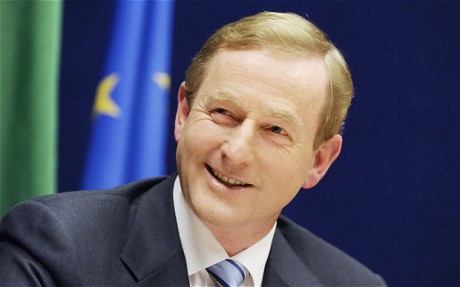
What happens to politicians? Why do they talk that way, in clichés, bromides, and waffle? Why do so many seem so comfortable with the arts of the fudge, the dodge, and the broken promise? Why does it seem like the further they climb up the ladder of power, the more likely they are to have forgotten why they ever began the ascent?
Popular stereotype would have it that the people who get involved in politics tend to be unprincipled power-grabbers. But I know a good number of politicians, and I just don’t think that stereotype is true. There are obvious exceptions, but in my experience the vast majority of people who get involved in politics do so because they want to make a difference, serve their community, and do some amount of good.
What changes them (not all of them, but far too many) is politics itself.
The Irish media has been much occupied recently with the appointment to the Senate of a man named John McNulty, a member of one of our two vaguely-centre-right-whatever-you’re-having-yourself parties, Fine Gael.
McNulty was nominated by Fine Gael to stand for the Culture and Educational panel of the Senate. The way Irish Senate elections work is complicated and more than a little farcicial, but while most Senators are elected by other elected politicians, there’s some expectations that they will have at least some relevant knowledge and expertise in the area of the panel they’re standing for.
From the Irish Times’s Harry McGee:
John McNulty has a lot going for him. He is a 37-year old businessman with a filling station and shop in Kilcar in South West Donegal. In addition he is the manager of the local GAA senior team, a highly successful club team which has produced a few generations of magnificent McHugh brothers. Kilcar, or Cill Charthaigh, is also a breac Gaeltacht and he has been involved in an Irish-speaking initiative and is also said to have an interest in music.
However, this, it seems, was not enough culture: because a little over two weeks ago, our Minister for the Arts, Heather Humphries, appointed him to the board of the Irish Museum of Modern Art. He’s since stood down from the position because – wait for it – the rules of the board prohibit him from remaining a member while standing for election.
We don’t know whether Humphries knew McNulty was to be a Senate candidate when she appointed him to the board of IMMA, nor do we know whether the Taoiseach (Prime Minister) Enda Kenny instructed her to appoint him. This is because neither the Taoiseach nor the minister have told anyone, despite repeated questions.
Now, when you look at a situation like this, a number of questions come to mind, but among the first has to be this: how, on a human level, could somebody do this? Dubiously ethical appointments to state boards are nothing new in Irish politics, but this particular stroke just seems so blatant, so obvious. Whoever it was who signed off on McNulty’s appointment to IMMA, I wonder if they looked in the mirror at any point in the process and wondered when they’d become the dodgy politician – the kind of politician that most people who get into politics want to fight.
People who are interested in a more Christian politics usually talk a lot about results. We’ll have a more Christian politics if we have justice for the poor, outlaw abortion, etc. It’s more or less taken for granted that Christianity can inform the ends that politics seeks to realise.
Christians don’t tend to spend as much time examining the means by which these ends are achieved – the processes and systems of politics itself. But it’s those systems that shape our politicians, and if they’re not encouraging virtue, then we’re making little monsters out of the women and men who aspire to lead us. And they’re pretty clearly not encouraging virtue: a typical government politician in a parliamentary system has to spend most of their career voting for policies that they may or may not support, and blandly assuring voters that they think everything the government does is great. This institutionalised, expected lying means that by the time a politician rises to a level where they can actually influence policy in a meaningful way, chances are that they’ve formed habits which will have done a lot to dull their former idealism.
This is pretty critical, not least when it comes to election promises: if we can’t trust politicians to implement the policies they say they’re goint to implement, then democracy becomes little more than an elaborate game.
“Power corrupts” is hardly a new insight: but somebody has to lead, and there are surely things we could do make it easier for our leaders to be moral.
Parties could have a three-tier manifestos, with the bottom tier being preferences, tier two being policy priorities, and tier one being absolute non-negotiables: promises which, if not kept, would result in leaving government.
Prime Ministers and Presidents could do regular half-hour interviews where only two questions were asked – questions that would be crowd-sourced and voted on online, with the two most popular being asked each week. The anchor could ask supplementary and follow-up questions, but would have to stay on the topic discussed for a full 15 minutes, making it very difficult for the political leader to avoid answering (I’d also like to see something like this happen for Bishops, perhaps at monthly diocesan meetings).
Rigid whip systems could be loosened, and members of parliament could be made much freer to follow their consciences.
The problem that presents itself to me is that a good few of the ideas I’m suggesting (a looser whip system, more individualised manifestos, stronger commitees) are already realities in America. And while they’ve solved some of the problems that plague parliamentary systems, there are few who would argue that US politics is particularly good at inculcating virtue.
What other reforms might work for the American context? Off the top of my head, I would think weakening the influence of the two major parties, and doing something about the epic amounts of money in politics wouldn’t hurt: and the mandatory interview proposal could still help get our leaders down from their ivory towers. I’m spitballing here, and would welcome any additional insight: what could we do to nudge our politicians towards virtue?












